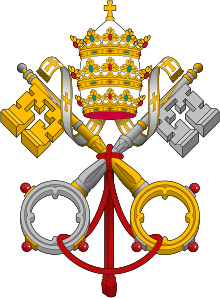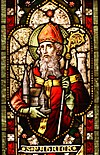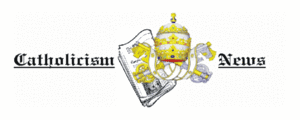Portal:Catholic Church
Introduction The Catholic Church, also known as the Roman Catholic Church, is the largest Christian church, with 1.39 billion baptized Catholics worldwide as of 2022. It is among the world's oldest and largest international institutions, and has played a prominent role in the history and development of Western civilization. The church consists of 24 sui iuris churches, including the Latin Church and 23 Eastern Catholic Churches, which comprise almost 3,500 dioceses and eparchies located around the world. The pope, who is the bishop of Rome, is the chief pastor of the church. The Diocese of Rome, known as the Holy See, is the central governing authority of the church. The administrative body of the Holy See, the Roman Curia, has its principal offices in Vatican City, a small independent city-state and enclave within the Italian capital city of Rome, of which the pope is head of state. The core beliefs of Catholicism are found in the Nicene Creed. The Catholic Church teaches that it is the one, holy, catholic and apostolic church founded by Jesus Christ in his Great Commission, that its bishops are the successors of Christ's apostles, and that the pope is the successor to Saint Peter, upon whom primacy was conferred by Jesus Christ. It maintains that it practises the original Christian faith taught by the apostles, preserving the faith infallibly through scripture and sacred tradition as authentically interpreted through the magisterium of the church. The Roman Rite and others of the Latin Church, the Eastern Catholic liturgies, and institutes such as mendicant orders, enclosed monastic orders and third orders reflect a variety of theological and spiritual emphases in the church. Of its seven sacraments, the Eucharist is the principal one, celebrated liturgically in the Mass. The church teaches that through consecration by a priest, the sacrificial bread and wine become the body and blood of Christ. The Virgin Mary is venerated as the Perpetual Virgin, Mother of God, and Queen of Heaven; she is honoured in dogmas and devotions. Catholic social teaching emphasizes voluntary support for the sick, the poor, and the afflicted through the corporal and spiritual works of mercy. The Catholic Church operates tens of thousands of Catholic schools, universities and colleges, hospitals, and orphanages around the world, and is the largest non-government provider of education and health care in the world. Among its other social services are numerous charitable and humanitarian organizations. (Full article...) Selected article
 The Second Crusade (1145–1149) was the second major crusade launched from Europe, called in 1145 in response to the fall of the County of Edessa the previous year. Edessa was the first of the Crusader states to have been founded during the First Crusade (1095–1099), and was the first to fall. The Second Crusade was announced by Pope Eugene III, and was the first of the crusades to be led by European kings, namely Louis VII of France and Conrad III of Germany, with help from a number of other important European nobles. The armies of the two kings marched separately across Europe and were somewhat hindered by Byzantine emperor Manuel I Comnenus; after crossing Byzantine territory into Anatolia, both armies were separately defeated by the Seljuk Turks. Louis and Conrad and the remnants of their armies reached Jerusalem and, in 1148, participated in an ill-advised attack on Damascus. The crusade in the east was a failure for the crusaders and a great victory for the Muslims. It would ultimately lead to the fall of Jerusalem and the Third Crusade at the end of the 12th century.
Selected image
 Oil-on-panel portrait of Sir Thomas More by Hans Holbein the Younger (1527)
Thomas More was a lawyer and political figure in 16th century England, best remembered as Henry VIII's Lord Chancellor. Selected biography
Did you know...

Related portalsFeast Day of June 2
Selected quote

News
SubcategoriesTopics
The Holy Bible:
Particular Churches (grouped by liturgical rite):
Things you can do
External resourcesWikiProjectsAssociated WikimediaThe following Wikimedia Foundation sister projects provide more on this subject:
Discover Wikipedia using portals |

































